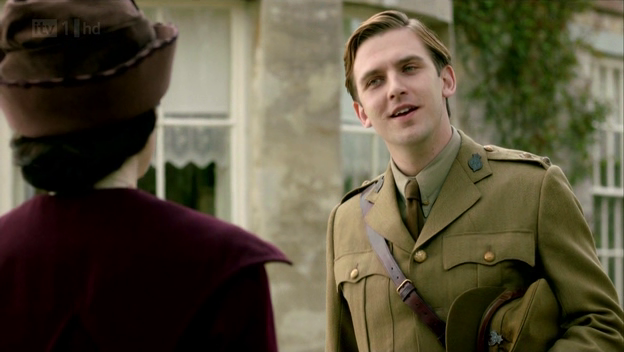
I'm a long-time Masterpiece Theater watcher -- when you grow up with no cable and only two of the three major networks reliably penetrate the mountain gaps, PBS becomes doubly important as a source of entertainment. Since moving away from home, I probably don't tune in quite as often, which is why I was late catching up to Downton Abbey. I saw enough of last season to get the gist of the main story lines, then tuned in for the premiere last Sunday night. I was even more interested since the story had advanced into the war years, and I have read and studied so much about the literature and history of that era. So while I still enjoyed the soap opera of it, the clothes, and Maggie Smith's one-liners, I did feel a guilty twinge at seeing the Great War trotted out as mere plot device and background scenery.
While I don't expect a popular TV show to turn into a documentary all of a sudden, I do wish the war aspects were handled more subtly and given a bit more gravitas, particularly since this is a British production and not a Hollywood hack job. It probably would have been better to dispense altogether with the trench and Somme battle scenes and not to have stuffed every single Great War cliche into two hours -- while giving nothing its due. The Womens Auxiliary Corps, Land Girls, the White Feather Campaign, Doing Your Bit, Getting a Blighty, Gas Blindness, Shell Shock, the Lost Generation...it's as if every topic from Great War 101 was dutifully introduced and bum-rushed off the stage. If there isn't a soldier-poet's untimely death introduced in the next episode or two I will be astonished!
Well, there I am just being crotchety. So to appease my conscience and balance out all the fluff and nonsense, below is a photo from the Imperial War Museum of London, showing a soldier from the actual Somme battlefield, where there was absolutely nothing romantic or glamorous happening.
 The poem below is from Siegfried Sassoon, one of my favorite poets, who survived the war and died the year I was born.
The poem below is from Siegfried Sassoon, one of my favorite poets, who survived the war and died the year I was born.Suicide in the Trenches
I knew a simple soldier boy
Who grinned at life in empty joy,
Slept soundly through the lonesome dark,
And whistled early with the lark.
In winter trenches, cowed and glum
With crumps and lice and lack of rum,
He put a bullet through his brain.
No one spoke of him again.
You snug-faced crowds with kindling eye
Who cheer when soldier lads march by,
Sneak home and pray you'll never know
The hell where youth and laughter go.
- Siegfried Sassoon, Counter-Attack, 1918
[Note: I reproduced the poem above faithfully from my 1918 edition, which may have included original typos -- "snug"/smug, "crumps"/cramps.]
No comments:
Post a Comment